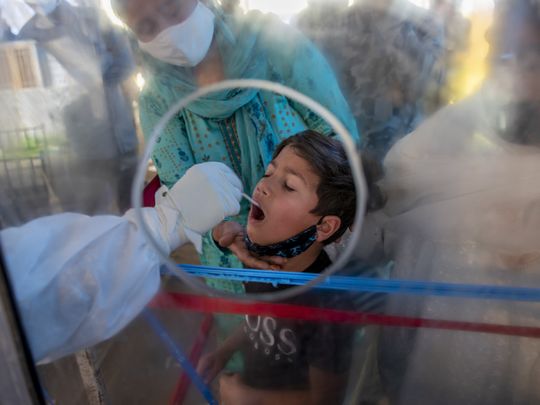
New Delhi: India reported more than 400,000 new infections on Saturday. The country now accounts for nearly half of the world's new known cases according to an AFP database, and it reported a national record 4,187 new deaths today.
While 170,841 COVID-19 patients across the country are on ventilator support, as many as 902,291 patients are on oxygen support, Union Health Minister Harsh Vardhan said on Saturday.
Cities buckle under COVID-19
At over 300,000, Karnataka's capital of Bengaluru has the highest active caseload of any Indian city. But experts warn the worst is still ahead as India's third largest city buckles under oxygen shortages, overrun hospitals and crowded crematoriums.
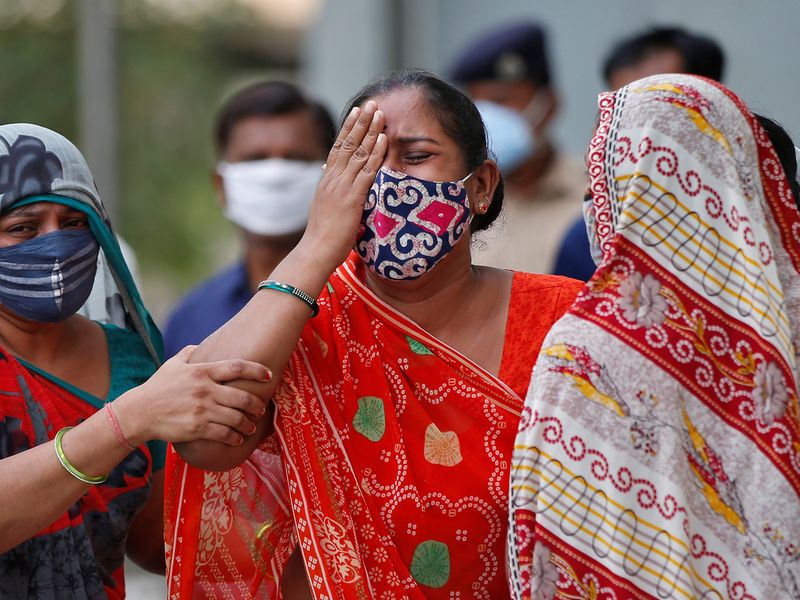
Infections have swelled in India since February in a disastrous turn blamed on more contagious variants as well as government decisions to allow massive crowds to gather for religious festivals and political rallies. Several states have implemented or called for complete lockdowns.
read more
- India: DCGI approves anti-Covid drug 2-DG developed by DRDO for emergency use
- COVID-19: India and its vaccine maker stumble over pandemic promises
- Amid surging COVID-19 cases, 9-day lockdown begins in the south Indian state of Kerala
- India records 1.5 million new COVID-19 cases in a week
- Pleas for help in India as COVID-19 leaves children without carers
With Tamil Nadu witnessing a sharp increase in COVID-19 cases (26,000 on Friday), the government on Saturday announced clamping a two-week "total lockdown" across the state to curb the spread of the pandemic, starting May 10. Chief Minister M K Stalin said in a statement the lockdown was being enforced due to "unavoidable reasons" and pointed out that the decision was taken based on inputs received at a review meeting he had with district collectors on Friday, besides consultations with medical experts.
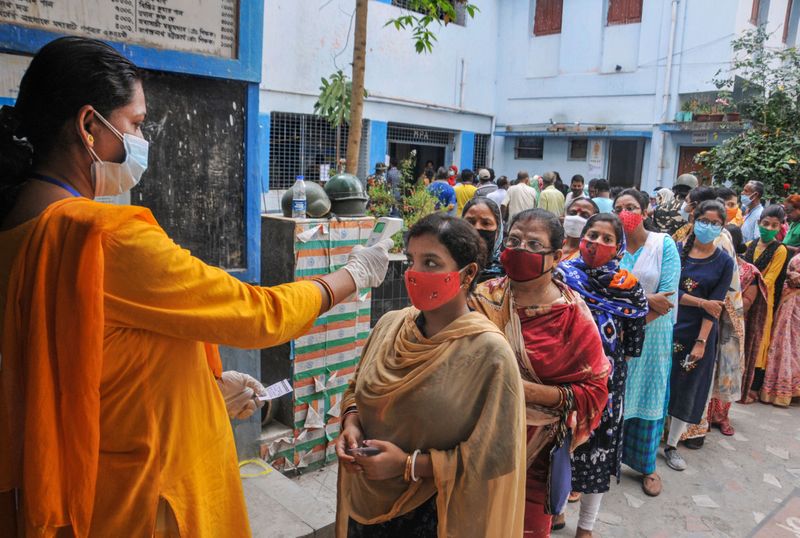
Shutting shops, suspending public vehicle transport and strictly restricting the on-road movement of people, Kerala came under complete lockdown from Saturday morning to contain the massive spread of COVID-19 pandemic. The restrictions came into force by 6am and would be extended up to May 16 midnight, official sources said.
The state government decided to impose a 9-day complete shutdown as the weekend restrictions and lockdown-like curbs imposed earlier failed to create any desired impact in terms of the daily caseload of the infected persons.
Himachal Pradesh, Uttarakhand, Jammu and Kashmir, Mizoram, Nagaland, Puducherry, Assam, West Bengal, Andhra Pradesh, Goa, Gujarat, Telangana, Chhattisgarh, Jharkhand, Odisha, Haryana, Madhya Pradesh, Uttar Pradesh, Punjab, Maharashtra, Delhi, Bihar, Rajasthan and Karnataka are other states in India that have imposed either complete lockdowns or partial curfew and restrictions.
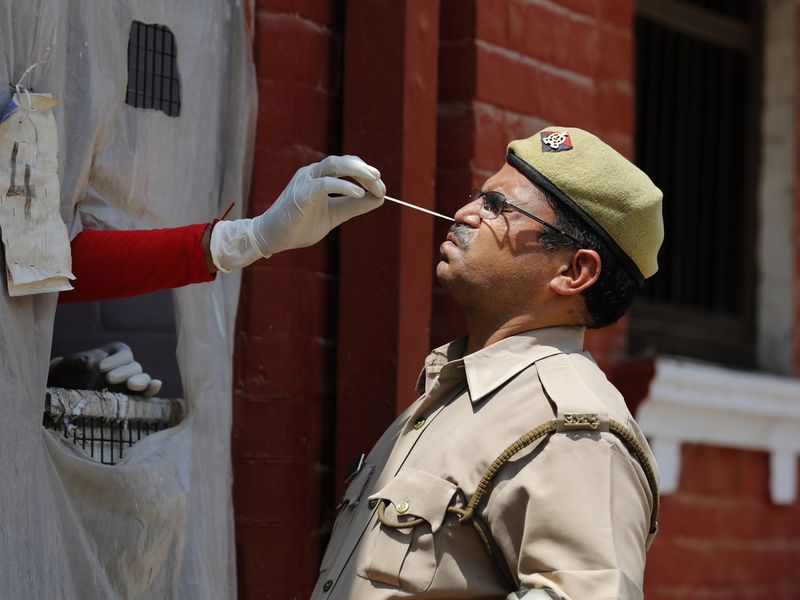
Vaccine shortage and approvals
- Covishield by Serum Institute of India (Oxford AstraZeneca jab)
- Sputnik V by Gamaleya Institute
Less than 3 per cent of the population has been fully inoculated. In some states, people are being turned away from vaccination centers that have run out of doses. Adar Poonawalla, the 40-year-old chief of the Serum Institute, told media that his firm alone doesn’t have the capacity to vaccinate India anytime soon, much less shoulder the burden of inoculating the world’s poor.
The Indian government, faced with vaccine scarcity announced that vaccines that have been approved by regulators in the US, the UK, European Union and Japan would be given fast-track approvals. The health ministry added that the first 100 recipients of such vaccines would be monitored for seven days before wider rollout is allowed.
This means that vaccines made by Pfizer and Moderna could become available for Indians. However, the government is yet to give any details.
US backs vaccine patent waiver
In positive news for India's vaccine needs, the United States this week backed a push led by the WHO, India and South Africa to waive COVID-19 vaccine patent protections to boost supply to poorer nations. Pope Francis on Saturday expressed his backing for "universal access to the vaccine and the temporary suspension of intellectual property rights", condemning the "virus of individualism" that "makes us indifferent to the suffering of others".
"A variant of this virus is closed nationalism, which prevents, for example, an internationalism of vaccines," the Pope said. "Another variant is when we put the laws of the market or intellectual property above the laws of love and the health of humanity."
European Council chief Charles Michel, attending an EU summit in Portugal, said the bloc was ready to discuss a US offer to suspend patent protection on vaccines - once the details are clear. The European Union meanwhile said it had sealed a deal with BioNTech/Pfizer for up to 1.8 billion extra doses of its COVID-19 vaccine.
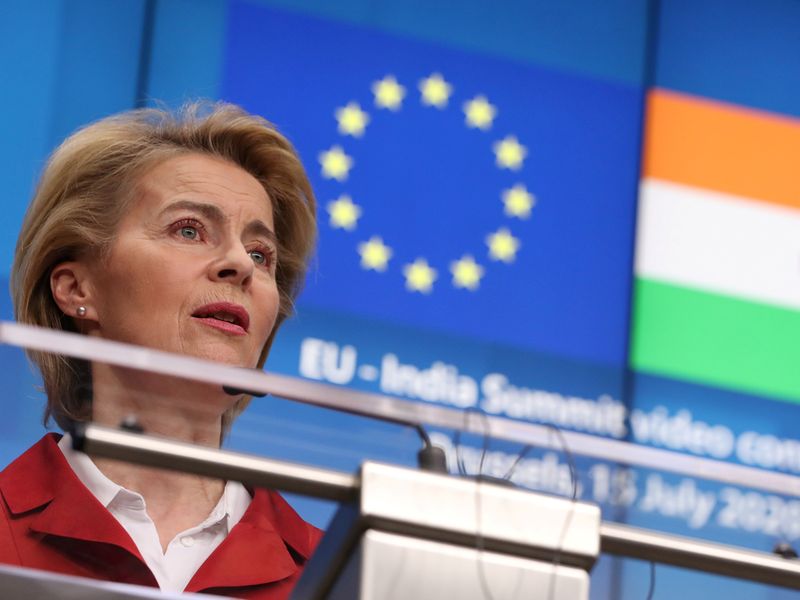
"Other contracts and other vaccine technologies will follow," EU chief Ursula von der Leyen said.
Vaccine arsenal growing
The global arsenal against the coronavirus expanded as the vaccine from China's Sinopharm became the first fully non-Western shot to get the green light from the World Health Organization. The WHO has already given emergency use authorisation to vaccines from Pfizer-BioNTech, Moderna, Johnson & Johnson, and AstraZeneca, a status that paves the way for countries to quickly approve and import shots.
Sinopharm is already in use in 42 territories around the world, including Pakistan, Egypt, the United Arab Emirates and Serbia.
Medical aid
An aircraft carrying oxygen cannulas and oxygen cylinders from Austria and oxygen cylinders from the Czech Republic arrived in India on Saturday. "An aircraft carrying 1900 oxygen cannulas and 396 oxygen cylinders from Austria and 500 oxygen cylinders from the Czech Republic arrives in India," tweeted Arindam Bagchi, official spokesperson of the Ministry of External Affairs (MEA).
"Grateful to both our EU [European Union] partners for this generous support.”
India has received medical help and assistance from the US, UK, Canada, Germany, France, in the form of oxygen concentrators, ventilators, raw materials for vaccines, PPE kits.
Canada offered 10 million USD to Indian Red Cross to facilitate essential goods and medical equipment to India.
Mental health is an issue too
As the country reels under the coronavirus pandemic for the second time, some government and private mental health helplines are striving to ensure the psychological well-being of people. With more restrictions put in place due to the surge in COVID cases, there has been in increase in distress calls to the helpline numbers.
The Ministry of Health and Family Welfare in coordination with National Institute of Mental Health and Neuro-Sciences (NIMHANS) Bengaluru, started a national toll-free helpline last year during the onset of the coronavirus. The helpline operates in 12 different languages to cater to the diversity of citizens and is working round-the-clock. It has five different categories, namely, children, women, adults, senior citizens and health care workers.
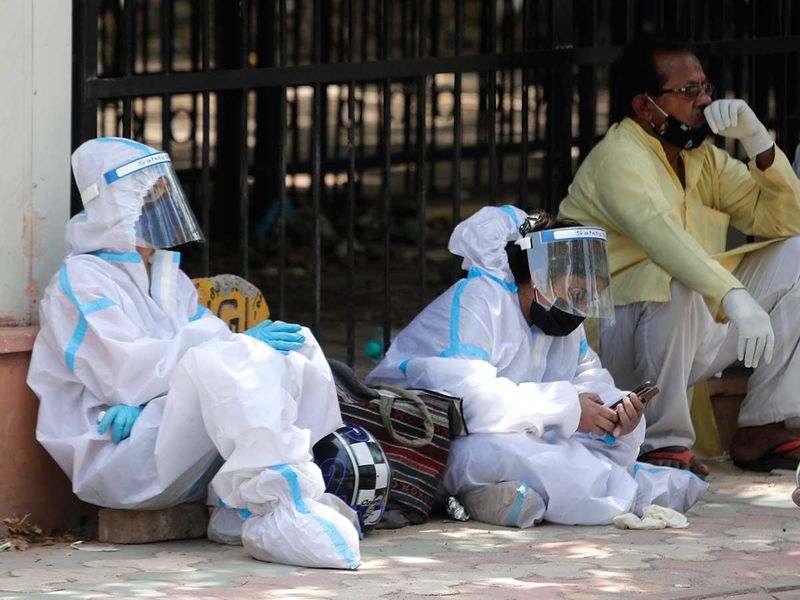
Dr Sanjeev Kumar M, Assistant Professor at Centre for Psychosocial Support in Disaster Management, NIMHANS, Bengaluru in conversation with ANI said, "This time around, majority of calls have been about issues related to medical care. For the first time, people are distressed about not getting oxygen, not getting beds."
"To address such callers, we have a list of helpline numbers of different states across the country. We try to connect them to local agencies or departments of the state," he added.
Pre-existing conditions, stress
Speaking about a recent case, he said, "I received a call from a 24-year-old young fellow. He had pre-existing mental illness and needs treatment. Due to the current situation of COVID, he could not go get the required treatment. He had isolated himself, was not able to eat or work and was very anxious. We connected him to a local doctor who had a tele-counselling session with him and sent an online medical prescription so that he can continue his medication course."
Elaborating further on the kinds of calls received, Dr Sanjeev said, "We have noticed three types of calls: logistic issues, psycho-social issues and pre-existing mental health problems."
"Logistic issues are resolved within 1-2 minutes, but psycho-social problems, for which the helpline was put in place, take about 10-15 minutes. We do a lot of follow up calls depending on the circumstances of the affected individual, for instance, in cases like anxiety, depression, worry, etc. Such problems cannot be resolved over one session. Since everything is uncertain, the call exchange may prolong depending on the continuity of the situation."
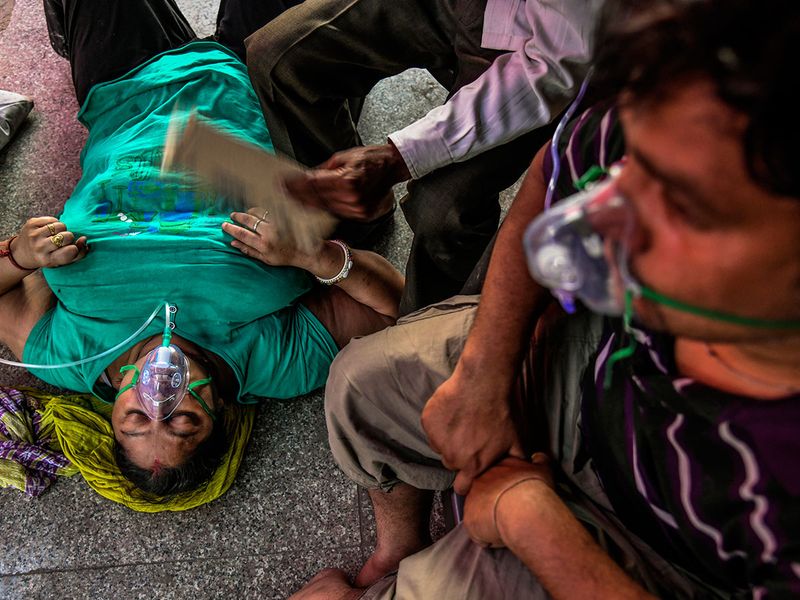
According to Nidhi, clinical psychologist, the doctors on this helpline answer 20-25 calls on an average per day.
Meanwhile, acknowledging the need for psychological support, Manasthali, a private Gurugram-based mental health clinic, has recently started a helpline service from 8am to 8pm. Founder-Director Dr Jyoti Kapoor built a team of 16 doctors comprising psychologists, therapists, and social workers to counsel people in significant distress via phone consultation and counselling.
Offering first two sessions of 20 minutes each, free of charge, the callers are required to book a slot in advance, which can be extended depending on the availability of psychologist/therapist. In an interview with ANI, Dr Jyoti Kapoor informed that Manasthali receives 5-10 calls on an average per day.
Depression and neglect
The service is aimed at addressing the following issues related to distress associated with COVID pandemic, anxiety related to COVID spread, doubts related to COVID transmission, treatment and vaccination, emotional and behavioural problems stemming out of restrictions related to pandemic and lockdown, overwhelming feelings related to sickness and death among family and loved ones due to COVID-19.
"There have been a number of cases related to COVID induced stress, even from people who have had COVID infection in the past," Kapoor added.
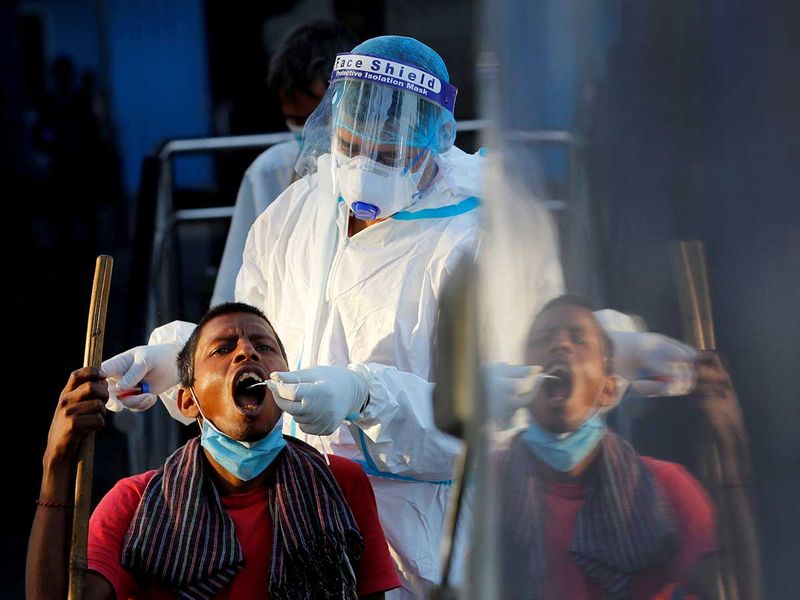
Speaking about a recent case that she dealt with, Dr Jyoti described, "A mother of a 16-year-old son had called expressing concern for her child who had withdrawn from the family. He barely spoke. On closer assessment of the child, it was declared that he was suffering from depression due to the current COVID scenario and had been neglecting it. We took the case seriously and handled the child. He is doing much better now."
"We provide a safe space for people to talk because many a time people ignore their mental health and the behaviour associated with it. It is important that people get this space so that their mental health can be analysed," said Dr Jyoti.
Neighbouring nations
The surge has also spilled into next-door Bangladesh, Nepal and Sri Lanka.
Pakistan began a nine-day shutdown targeting travel and tourist hot spots to try to stop its outbreak from snowballing during the upcoming Eid celebrations at the end of the Islamic holy month of Ramadan.
The Eid holidays usually see a mass movement of people across the nation of 220 million, and the government has mobilised the military to help enforce the restrictions.
- Inputs from ANI, AP, Reuters, AFP, Bloomberg








